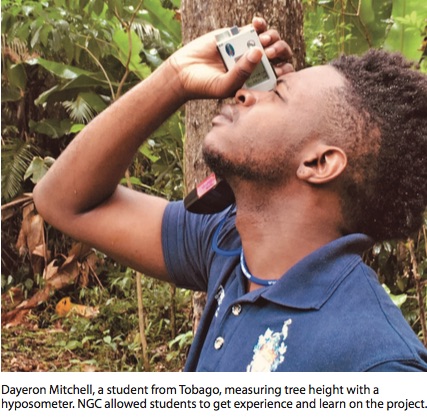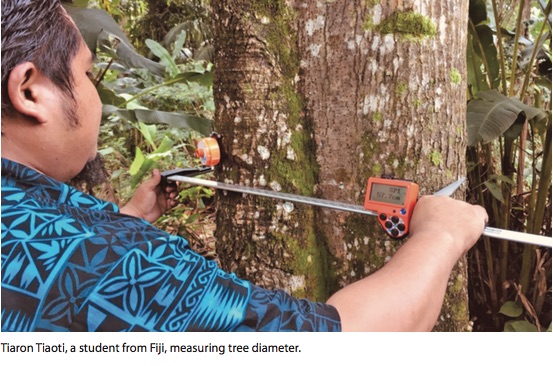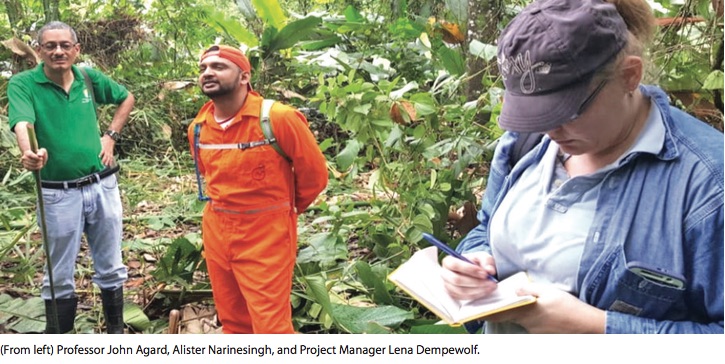
UWI partners with NGC on the company’s massive carbon reduction project to restore Trinidad’s forests
Temperatures are rising. Droughts drag on, exacerbating wild fires. Caribbean countries prepare for deadlier hurricanes. The effects of climate change are rampant, and many governments have begun implementing policies to combat the dangers. The UWI too is committed to applying research to make an impact. To that end, a ground-breaking partnership with the National Gas Company (NGC) is making an impression on Trinidad and Tobago’s environmental imprint.
As a signatory of the Paris Agreement, Trinidad and Tobago is pledged to reduce its significant carbon emissions. Excessive carbon is one of the major culprits of environmental problems. This country has committed to a reduction of cumulative greenhouse gas emissions by 15%, by 2030. NGC’s reforestation project is one such mechanism for achieving this goal.
Myles Lewis, NGC’s Head, Corporate Social Responsibility, explains, “We have a Sustainable Energy Strategy which seeks to create value through the implementation of sustainable energy projects locally, in the Caribbean and in Latin American regions”. NGC has been working to replant hectares of trees lost due to pipeline construction.

In 2005, NGC began replanting in Rio Claro, Moruga, Rousillac, Morne L’Enfer and Mayaro for several years now. Overall 100,000 trees were planted on 348 hectares of land. One of the results of the project was the creation of a significant carbon sink, an area that can absorb carbon dioxide from the atmosphere.
To monitor the effects, in 2018 NGC contracted UWI’s Office of Research Development and Knowledge Transfer (now the Centre for Innovation and Entrepreneurship) to conduct a carbon sequestration study.
Professor John Agard, Department of Life Sciences, Faculty of Science and Technology, led the research development team which entered the forested areas to gather data. The UWI team ascertained biomass by measuring each tree’s height with a remote sensing technique called Light Detection and Ranging (LiDAR) and by checking each tree’s diameter so as to determine the amount of carbon stored by a tree. Samples of the wood were run through a carbon analyser.

Results were heartening. As of 2018, the trees had sequestered 2,243 tonnes of carbon and the research team estimated that the numbers would reach 5,228 tonnes by 2030. This amounts to at least 1% of the CO2 tonnage this country aims to cut from the transportation sector by that date.
In applauding NGC’s ground breaking initiative, Professor Agard shared his pleasure that “UWI is demonstrating that it has some knowledge and expertise which can be leveraged by companies in the country to decrease their carbon footprint”.
The project has already attracted the interest of entities like the Inter-American Development Bank. In addition, The UWI team is partnering with the Institute of Marine Affairs and the British High Commission to conduct another study of blue carbon sequestration in mangrove areas. The goal is to duplicate this research in other Caribbean countries in the hope that “industries will get interested in replanting mangroves along the coastline to sequester carbon and protect the coastline from eroding,” explained the professor.
This carbon reduction initiative underlines how everyone can contribute to climate change mitigation. “There is a strong need for education around our local forests and the key role they play in our survival,” said Lewis. NGC plans to continue the project with planting and education as well as literacy and community economic developments and hopes to “play a role via knowledge and information transfer for other organizations seeking to initiate such a project.”

Addressing individual responsibility, Professor Agard commended smaller scale tree planting activities but recommended going beyond planting a tree once a year. “We should have a longer term initiative where people are encouraged to plant trees on an ongoing basis.” He observed that government’s push for more households to have energy-efficient LED bulbs is a good one but stressed the importance of a simple remedy such as car-pooling.
Trinidad and Tobago, he said, has a very large carbon footprint considering its relatively small population. “We produce the world’s second highest emissions per capita, but the work of NGC and UWI underscores that this country can contribute to rescue efforts to save the world.”